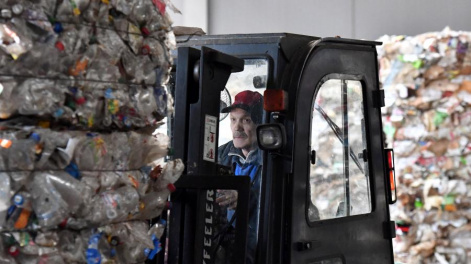Biodegradable polymers will become twice cheaper
25 August 2019 г.

The polymer is obtained using the bacteria which, feeding on different substrates (e.g. sugar solution or glycerin) grow and synthesize valuable compounds including bio-plastics. The microorganisms use these substances as a building material to synthesize cell components which are necessary for them. They include intercellular supplies of monocarboxylic acid polymers, which are degradable. One of the advantages of such a substance is a possibility to change their properties by adding new components to the initial substrate. The scientists say that as a result of this process, metabolism in these bacteria changes, which leads to obtaining a material with new characteristics.
— “The process of biosynthesis looks in the following way. First, the scientists place some colonies of the cell culture Cupriavidus eutrophus B-10646 into a medium with a new composition with a small concentration of an additive (it can be an organic acid); then, the colonies best adapted to the newly created conditions are chosen, says senior research associate of the Institute of Biophysics KSC SB RAS, assistant professor of SibFU Natalia Zhila. — Further, the substrate saturation is increased and the selection of the microorganisms is repeated until, after several tens of generations of the isolate, strains are obtained which are capable of growing under new conditions.”
The microorganisms used are said to have high productivity.
— “Using 100 g of the bacteria spread in a liter of a liquid (e.g. in a substrate based on glycerin) we can obtain up to 80 g of the polymer every 60 hours, and this rate twice exceeds the results of foreign colleagues,”- emphasizes Natalia Zhila.
The available set of microorganisms allows the scientists to synthesize several plastics different in their properties and applicable in various areas. In particular, the bacteria can be used to create a polymer package material which, unlike its analogs based on oil, will naturally decompose.
— “In contact with natural destroying bacteria our polymer is decomposed into water and carbon dioxide. Moreover, its durability and properties (e.g., plasticity) can be regulated by introducing special additives-plasticizers into the initial substrate,” - explains the researcher.
— “At this stage, a biodegradable plastic bag made of our polymer will cost about 140 roubles, which is more expensive than a similar bag made of paper or standard polyethylene, explains the assistant professor of the department of Biotechnology of SibFU Anna Shumilova. However, the price can be reduced in the case of creating large-scale facilities and locating them near enterprises of food industry so that its wastes could become the most available substrates for growing the bacteria.
Also, it is planned to use the new plastic in medicine, in particular, for the production of bandaging materials, sutures and bone prostheses having high bio-compatibility. Using items made of biodegradable polymer will reduce the risk of rejection and increase the quality of the treatment. Besides, the material prevents the necessity of the second operations since it is able to decompose in an organism.
At present, a gram of the medical plastic variety costs about 2 000 roubles. However, after the launch of the production it is planned to reduce the price to 300 roubles for the new items to compete with the market analogues.
Though, some experts still have doubts concerning the fast transfer to using such polymers. It is worth applying biodegradable plastics in medicine since they do not cause allergy and are absolutely compatible with the human organism. However, for the large-scale production of packages (measured in tons) even the increased productivity of the bacteria will not be sufficient.
In the opinion of the scientists, as a result of the work carried out, the net cost of the biodegradable plastics can be reduced by several times, which can increase the area of their applications in various areas.
Source: Izvestia
Share:
